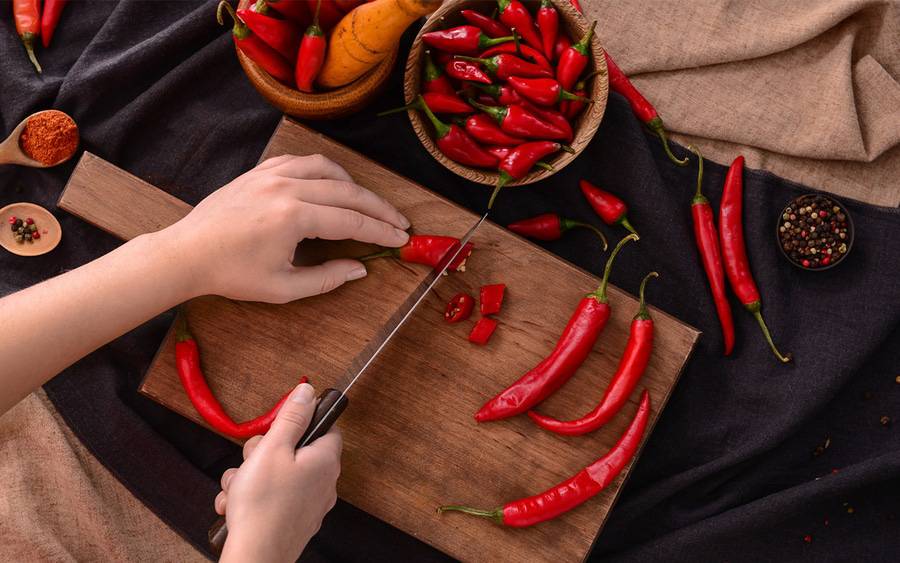Can Spicy Foods Lower Blood Pressure?
Chili peppers may do more than add spice to your plate

Chili peppers may do more than add spice to your plate
High blood pressure, or hypertension, is a leading risk factor for heart disease and stroke. According to the Centers for Disease Control and Prevention (CDC), nearly half of American adults have high blood pressure. Many of them do not even know it.
One of the most common contributors? Too much sodium. Many people consume far more salt than they think, even if they rarely reach for the saltshaker.
“Patients frequently tell me that they eat very little salt, but what they’re saying is that they’re not adding salt from the saltshaker,” says Christopher Suhar, MD, a cardiologist and director of the Scripps Center for Integrative Medicine. “A lot of patients have misconceptions about how much salt is already in their food.”
That’s because most of the sodium we eat comes from processed and packaged foods — not from what we add at the table.
The good news is that it may be possible to reduce your craving for salt — and spicy foods like chili peppers could help.
Research suggests that capsaicin, the compound that gives chili peppers their heat, may make salty foods taste more flavorful. This can help people feel satisfied with less salt, making it easier to cut back on sodium without losing taste.
How sodium affects blood pressure
Most adults should limit their daily sodium to 2,300 milligrams or less, according to the American Heart Association. For better heart health, the best target is 1,500 milligrams. These amounts may seem high, but a quarter teaspoon of table salt has 575 milligrams of sodium.
The average American consumes about 3,400 milligrams of sodium per day — far more than the recommended limit. One major reason is that many people rely on processed and packaged foods, which often contain large amounts of hidden salt. Even items that don’t taste salty, like bread, cereal or sauces, can contribute to sodium overload.
Can spicy foods help lower blood pressure?
Yes — research suggests that spicy foods, such as chili peppers, may help support healthy blood pressure.
A study of over 600 Chinese adults published in Hypertension found that people who regularly ate spicy foods had lower blood pressure and consumed less sodium. Capsaicin, the active compound in chili peppers, may heighten the taste of salt, helping food taste flavorful with less of it. This can make it easier to reduce sodium intake — an important step in managing high blood pressure.
Other studies have also linked spicy food consumption to a lower risk of hypertension, particularly in women.
But it’s not a cure-all
Spicy food can be a helpful addition to a heart-healthy diet, but it’s most effective when paired with other lifestyle changes.
“In order to reduce salt intake, consumers need to be educated about how to read food labels and find hidden sources of salt in their diets. Salt substitutes also can help, and this study suggests that spicy foods may be another alternative,” Dr. Suhar says.
Make simple changes
To support healthy blood pressure, try making these simple changes in your daily routine:
Read nutrition labels: Look for products labeled “low sodium” or “no added salt.” Pay attention to serving sizes and avoid foods with more than 20% of the daily value (DV) of sodium per serving.
Choose fresh foods: Whole fruits, vegetables and fresh cuts of meat or poultry have little to no added salt. Cooking at home using fresh ingredients lets you control the amount of sodium in your meals.
Use salt substitutes: Try seasoning food with lemon juice, vinegar, garlic, herbs like basil or rosemary, or salt-free spice blends. These add flavor without raising sodium levels.
Limit processed foods: Cut back on canned soups, deli meats, snack foods, frozen dinners and sauces. Even items that don’t taste salty, like bread and cereal, can contain hidden sodium. Preparing meals at home can help reduce your intake.
How exercise supports healthy blood pressure
Staying active is one of the best ways to manage high blood pressure, especially with a healthy diet.
Regular exercise makes your heart stronger. This helps it pump blood better. It also improves circulation and helps your body remove extra sodium through sweat and urine.
Whether you are just starting or already active, regular movement is a great way to protect your heart and support your health.
Combining exercise with smart food choices, like eating less sodium, can improve your results. Interestingly, spicy foods like chili peppers may also help.
Chef Deborah Scott’s spicy fish marinade
Managing high blood pressure doesn’t mean you have to give up great flavor. Looking for a tasty way to cut back on salt? Try this bold, heart-friendly marinade from celebrity chef Deborah Scott. It’s a simple way to bring heat and depth to your dish — without reaching for the saltshaker.
A fixture of San Diego’s dining scene since 1995, Chef Deb is known for her eclectic, globally inspired cuisine at Cohn Group Restaurants. In this recipe, she adds a flavorful kick to grilled fish using sambal, a vibrant chili paste made from ground red peppers.
Ingredients (Serves four)
1/3 cup sambal
2 tablespoons cilantro, finely chopped
1 tablespoon mint, finely chopped
1 cup apple cider vinegar
1 tablespoon lemon juice
1/2 tablespoon salt (optional)
1/2 tablespoon pepper
Calories: 15 Fat: 0 g Saturated fat: 0 g Trans fat: 0 g Cholesterol: 0 mg Sodium: 438 mg Carbohydrate: 4 g Fiber: 0 g Sugar: 9 g